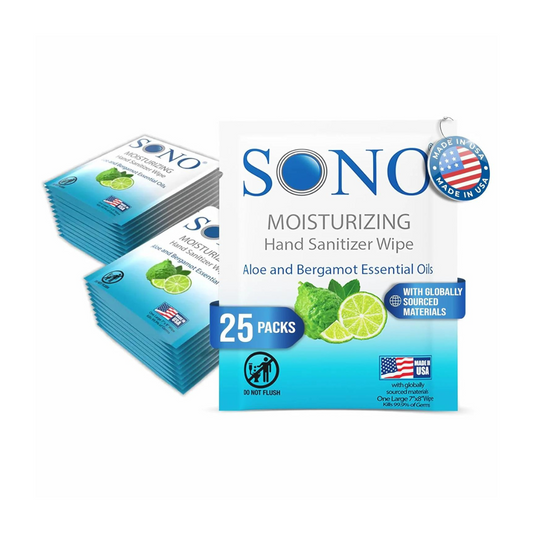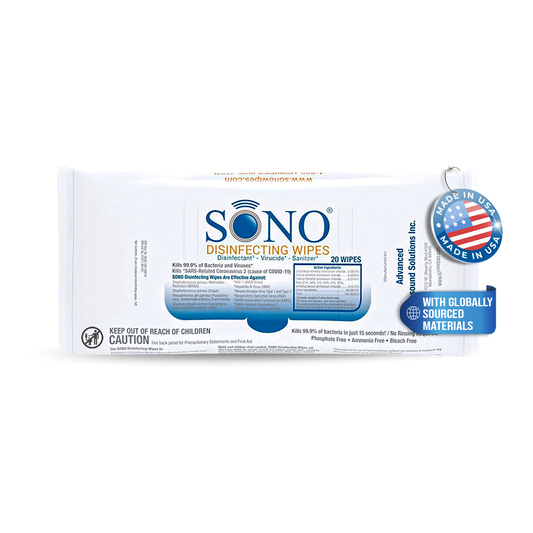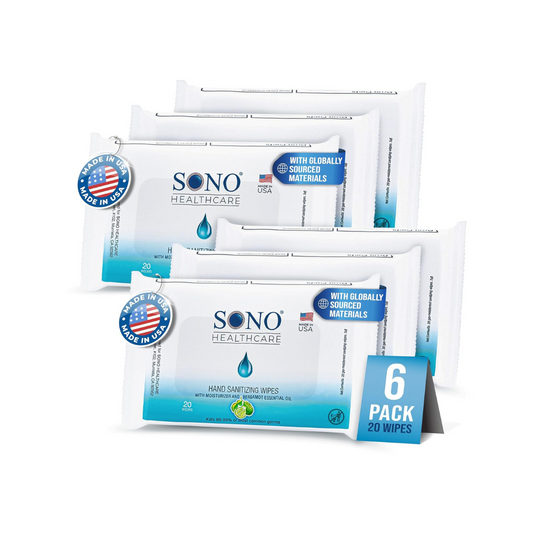In recent years, disinfectant wipes have become a must-have in homes, offices, and public spaces. They’re tucked into purses, stashed in glove compartments, and offered at the entrance of nearly every grocery store. Their convenience and effectiveness at killing germs on surfaces make them a popular choice for staying clean and safe.
But with their growing use, many people are asking an important question: Can you use disinfectant wipes on your skin?
No, you can’t use disinfectant wipes on your skin. These wipes are specifically formulated for cleaning and disinfecting hard, non-porous surfaces, not human skin. Using them on your body can lead to irritation, allergic reactions, or even chemical burns, depending on the ingredients involved. While they may seem like a convenient option in the absence of hand sanitizers or soap, their chemical composition makes them unsafe for direct skin contact. Let’s check out more about disinfectant wipes below:
Understanding What Disinfectant Wipes Are?
Disinfectant wipes are pre-moistened towelettes soaked in chemical agents designed to kill bacteria, viruses, and fungi on non-porous surfaces. The active ingredients in these wipes typically include quaternary ammonium compounds, alcohol, hydrogen peroxide, or bleach—all highly effective at sanitizing surfaces like metal, plastic, and glass.
However, these ingredients are not designed with skin safety in mind.
Many of the most popular brands of disinfectant wipes—including those used in households, healthcare settings, and workplaces—explicitly state on their labels that they are not intended for personal hygiene or skin use. That’s a crucial indicator that we shouldn’t ignore.
However, these ingredients are not designed with skin safety in mind.
Many of the most popular brands of disinfectant wipes—including those used in households, healthcare settings, and workplaces—explicitly state on their labels that they are not intended for personal hygiene or skin use. That’s a crucial indicator that we shouldn’t ignore.
What Happens If You Use Disinfectant Wipes on Skin?
So, can you use disinfectant wipes on your skin? No, you can—but should you? That’s a different story.
Here are some potential outcomes of using these wipes on your skin:
1. Skin Irritation
Disinfectant wipes often contain fragrances, preservatives, and alcohols that can strip your skin of its natural oils. This can lead to dryness, redness, and inflammation, especially if you have sensitive or broken skin.
2. Chemical Burns or Rashes
Some ingredients, especially bleach or quats (quaternary ammonium compounds), are too harsh for human skin and can cause chemical burns or contact dermatitis. Prolonged or repeated exposure significantly increases this risk.
3. Allergic Reactions
Fragrances and preservatives like methylisothiazolinone are known allergens that may trigger itching, swelling, or hives in certain individuals.
4. Disruption of Skin Barrier
Your skin acts as a protective barrier against pathogens. Using harsh disinfectants can compromise this barrier, making it easier for bacteria and irritants to penetrate and cause infections or reactions.
Are Disinfectant Wipes Safe on Skin?
Disinfectant wipes are not designed or tested for use on human skin. Their chemical formulations, which often include strong agents like quaternary ammonium compounds, alcohol, or bleach, are intended for cleaning hard, non-porous surfaces—not the delicate surface of your skin. Using them on your hands, face, or other body parts can strip away natural oils, cause irritation, and damage the skin barrier over time.
For safe and effective skin hygiene, it’s best to choose products specifically made for skin contact. Options like moisturizing hand wipes, alcohol-based hand sanitizing wipes, or foaming hand sanitizers are formulated to kill germs while being gentle on the skin. These alternatives maintain cleanliness without exposing you to the potential risks associated with harsh disinfectants.
The Difference Between Disinfectant Wipes and Hand Wipes
It’s easy to confuse the two, but disinfectant wipes and hand wipes serve completely different purposes:
|
Feature |
Disinfectant Wipes |
Hand Wipes / Sanitizing Wipes |
|
Intended Use |
Surfaces like tables, doorknobs |
Human skin, especially hands |
|
Active Ingredients |
Harsh chemicals (e.g., bleach, quats) |
Alcohol (typically 60–70%), aloe, skin conditioners |
|
Safe for Skin |
No |
Yes |
|
Regulatory Body |
EPA |
FDA |
Always check the label. If the packaging says "for use on hard, non-porous surfaces" or "not for skin," avoid using it on yourself.
What to Do If You Accidentally Use Disinfectant Wipes on Skin
If you’ve already used a disinfectant wipe on your skin and are experiencing mild irritation:
-
Rinse thoroughly with soap and warm water.
-
Apply a gentle moisturizer to soothe dryness or redness.
-
Avoid further exposure to harsh cleaning agents.
However, if you experience burning, swelling, or a rash that doesn't subside within 24 hours, consult a healthcare professional. In rare cases, you may require prescription creams or allergy medication.
Safer Alternatives to Disinfectant Wipes for Hands
Instead of reaching for a surface disinfectant, consider these safer options specifically designed for human skin:
1. Alcohol-Based Hand Sanitizing Wipes
These contain 60–70% alcohol and may also include soothing agents like aloe vera or glycerin to protect the skin. They’re ideal for quick hand cleaning when soap and water aren’t available.
2. Soap and Water
Still the gold standard for hand hygiene. Wash your hands for at least 20 seconds with lukewarm water and soap. It’s effective and gentle when done properly.
3. Hand Sanitizer Gel
FDA-approved hand sanitizers are both safe and effective when soap isn’t an option. Look for products that are fragrance-free and made for sensitive skin if irritation is a concern.
Best Practices for Disinfectant Wipe Usage
While the answer to “Can you use disinfectant wipes on your skin?” is generally no, these wipes still play a vital role in public health when used correctly.
Here are some usage tips:
-
✅ Use gloves when cleaning with disinfectant wipes for prolonged periods.
-
✅ Allow surfaces to remain wet for the full contact time listed on the label.
-
✅ Store wipes in a cool, dry place to prevent them from drying out.
-
✅ Never flush wipes down the toilet—they can clog plumbing and damage water systems.
-
✅ Keep disinfectant wipes out of reach of children to prevent accidental exposure.
Children and Disinfectant Wipes: A Cautionary Note
Children’s skin is thinner and more sensitive than adults', making them even more vulnerable to the chemicals found in disinfectant wipes.
Parents should never use disinfectant wipes to clean a child’s hands, face, or body. Opt for baby wipes, hypoallergenic sanitizing wipes, or a gentle soap instead.
Disinfecting Your Belongings — Without Harming Your Skin
If you need to sanitize frequently touched objects like phones, keyboards, or steering wheels and don’t want to risk skin exposure, follow these tips:
-
Use gloves while wiping down surfaces.
-
Let items air dry before handling.
-
Disinfect in well-ventilated areas to reduce inhalation risk.
-
After cleaning, wash your hands to remove any lingering chemical residue.
How to Read Labels and Choose Wisely
Always check the packaging before using any wipes. Look for labels like:
-
"Safe for skin"
-
"Dermatologist-tested"
-
"Alcohol-free"
-
"Moisturizing"
Avoid products that contain bleach or high concentrations of alcohol unless they're specifically formulated for skin use.
FAQs About Using Disinfectant Wipes on Skin
1. What happens if you use disinfecting wipes on skin?
-
You may experience irritation, dryness, or allergic reactions due to the harsh chemicals not meant for human use.
2. Are disinfectant wipes safe on skin?
No. They are made for non-porous surfaces and contain ingredients not tested or approved for skin contact.
3. Can you put disinfectant wipes on your skin in emergencies?
If you must clean your hands and no other options are available, use them sparingly and wash off as soon as possible. Still, this is not advised and should be a last resort.
4: Can you put disinfectant wipes on your skin?
It's not advisable. If you must use one in a pinch, rinse or wash your hands and apply moisturizer soon after.
Final Thoughts
Disinfectant wipes are excellent tools for maintaining hygiene in our environments, but they are not designed for skin use. While the temptation to wipe down your hands with a nearby surface wipe may seem convenient, it’s a risk that’s simply not worth taking.
So, can you use disinfectant wipes on your skin? The answer is clear: no, not safely or effectively.
Instead, use products intended for human skin, like alcohol-based hand sanitizers or sanitizing hand wipes. These are formulated to kill germs while preserving the health of your skin.
Taking this small precaution helps you stay both clean and protected, a safe way.





